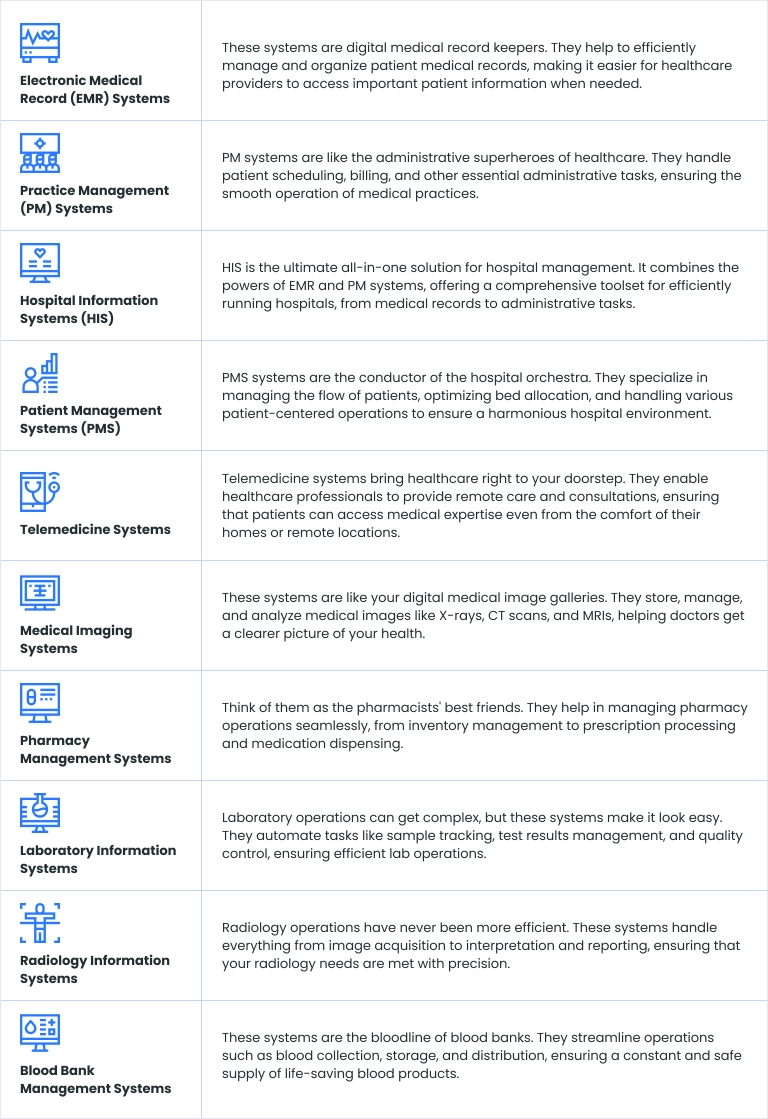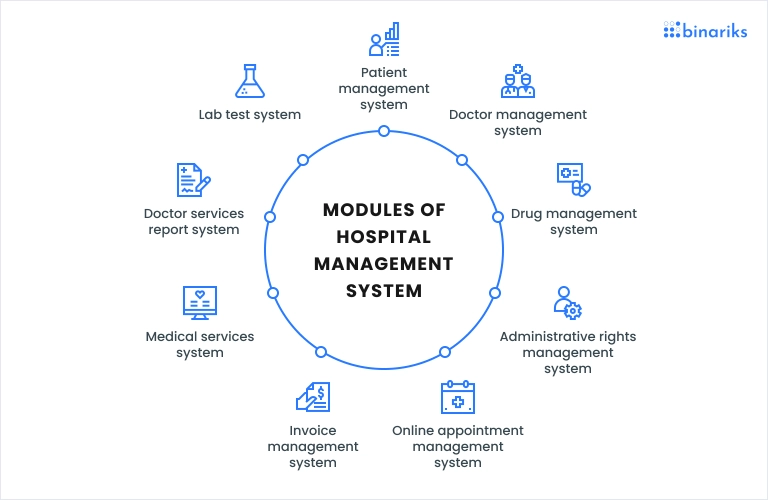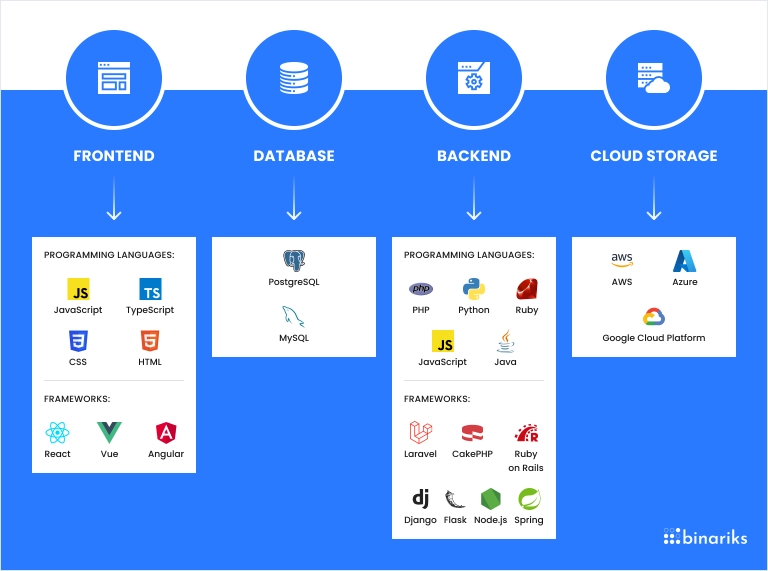Recent studies have brought to light some alarming statistics: in the United States alone, medical errors contribute to a staggering 250,000 deaths each year. Globally, these numbers are even more concerning. The cost of a medical error can be immeasurable — it can mean another person's life. In light of these sobering figures, there's a growing recognition of the vital need to optimize healthcare administration (source ).
In response to this pressing need, the healthcare industry has witnessed a remarkable shift towards digitalization. This transformation has been punctuated by the development of innovative software solutions tailored specifically for hospitals. At the forefront of this digital revolution is the Hospital Management System (HMS), a sophisticated software designed to streamline and enhance every aspect of hospital operations.
In this comprehensive article, we will delve deep into the world of Hospital Management Systems, exploring their potential benefits, increasing importance and popularity. We'll cover various facets of HMS, for example, how to develop a hospital management system with experts like Binariks, or what are the types of HMS systems available. We'll also highlight the key hospital management system features and modules that make HMS indispensable in modern healthcare settings.
Along the way, we'll delve into the technical aspects, including the data types and tech stack commonly used in these systems. And to wrap things up, we'll discuss an essential aspect often on the minds of healthcare administrators – the cost of building a Hospital Management System. Let's start from the very beginning!
Potential benefits of HMS
HMS offers a wealth of advantages that benefit both healthcare providers and patients. That's the reason for the growing demand. Understanding these benefits is crucial for ensuring a well-designed system that caters to the needs and expectations of clients.
Enhanced productivity and streamlined daily operations
Imagine a system that simplifies the daily activities of hospital staff, enabling them to complete tasks faster and with greater reliability. That's precisely what a well-designed HMS accomplishes. By automating processes such as updating patient histories and adjusting medication lists based on a patient's condition, an HMS significantly reduces the risk of errors attributable to human factors.
This boost in work efficiency extends to minimizing downtime and reducing queues for medical equipment and operation rooms. For instance, when a patient cancels an appointment, the relevant doctor's schedule is instantly updated in real-time, ensuring smooth operation.
Enhanced communication across departments
A hospital operates as a complex mechanism, demanding precise coordination and swift responses from its various constituents to provide effective services. One of the hospital management software features is the efficient facilitation of seamless communication between hospital departments and wards.
It enables the rapid, secure acquisition of critical data, such as analysis results, operation room schedules, and pharmacy inventory, in both digital and print formats. This fosters efficient collaboration among departments, ensuring the smooth functioning of the entire healthcare ecosystem.
Improved patient experience
The patient's journey through a hospital should be as easy and pleasant as possible. A reliable and user-friendly HMS can significantly enhance the patient experience. Patients receive timely notifications about doctor appointments and medication schedules, contributing to their overall satisfaction and trust in hospital services. This, in turn, attracts more clients and enhances the facility's reputation.
Streamlined payment and billing processes
Hospitals are not just healthcare providers, they are also business entities engaged in various financial transactions with multiple stakeholders.
A well-implemented HMS supports various forms of payment for medical services and products, simplifying financial transactions for all parties involved. This feature enhances the financial efficiency of the hospital's operations.
Comprehensive insights into staff performance
An HMS offers an additional business advantage by tracking the performance of hospital personnel and providing detailed reports to the administration. These reports empower hospital management to identify which types of hospital services generate more revenue and which departments may require reduced funding or temporary closures. Moreover, they help identify and resolve potential issues before they escalate, safeguarding both the hospital's finances and its reputation.
These features of the hospital management system have a whole bunch of advantages that are fueling HMS's ever-growing importance and adoption throughout companies.
Hospital management software development with Binariks
At Binariks, we're all about making healthcare software that rocks. There are a bunch of fantastic solutions in our portfolio, and here are a few that we're particularly proud of:
Healthcare for travelers
Our Spanish healthcare provider client needed to improve their web platform, connecting travelers with doctors worldwide. Code inconsistencies and technical limitations were holding them back.
Binariks formed a dedicated team and decided to rebuild the platform from scratch. The result? A highly-scalable web app with online editing, video conferencing, and an upgraded doctor's calendar. This revamped platform caters to patients and healthcare managers, streamlining registration, reducing staffing needs, and enhancing security with PHI compliance.
Medicare healthcare platform
A medical corporation needed to scale its AWS-powered platform, automate Medicare reimbursements, and ensure HL7 FHIR standard compliance.
Binariks partnered with them to create a scalable, secure, and cost-effective solution using AWS serverless technologies and Node.js/React. Now, the platform handles increased data volumes, streamlines insurance reimbursements, and enhances healthcare management for Medicare beneficiaries.
CareBridge healthcare tech
CareBridge, a healthcare tech corporation, faced challenges after acquisitions, including legacy software and the need to migrate from Objective C to Swift. They also wanted to upgrade their Android app and develop new products.
We formed a dedicated team to work on database management, backend maintenance, and coding, ensuring a smooth transition to modern technology. The ongoing partnership has resulted in significant advancements, including electronic visit verification, 24/7 member support, and predictive decision support. CareBridge's impressive $40 million funding round in 2020 reflects its success.
We believe in crafting software that aligns with industry expectations. Our team of experts collaborates closely with clients to understand their needs and challenges, delivering custom solutions that make a real impact. With over a decade of experience in health tech, Binariks is here to help you tackle challenges and turn your ideas into reality.
Contact us to explore more about our expertise and discover how we can elevate your journey.
Types of HMS systems
Efficient system design for hospital management systems is crucial in the healthcare industry's ongoing evolution. It serves as the backbone of healthcare facilities, optimizing operations and improving patient care. In this section, we'll explore various types of HMS systems and delve into their critical roles in enhancing healthcare management.

Hospital management system design is a multifaceted approach to healthcare optimization. From Electronic Medical Records (EMRs) to Telemedicine systems, these solutions are at the heart of modern healthcare, supporting both medical professionals and patients in their quest for quality care.
Features of a hospital management system
When it comes to hospital management software development, you need to understand the extensive features that make up a HMS. These software solutions are designed to simplify and enhance various aspects of healthcare, so, let's dive into more details.
Process optimization
A medical management system leads to a better alignment and scheduling of all processes within a healthcare organization. Enhanced communication and information exchange improve the cooperation of managers, healthcare practitioners, and patients.
Error reduction
A dependable hospital management software system uses data processing algorithms to provide the most accurate estimations. It also keeps all healthcare practitioners connected and supported with relevant data. All their actions are recorded, which increases accountability. Such an organized approach minimizes the threat of administrative errors.
Data storage capacity
Managerial systems for hospitals provide high capacities for storing patients’ private data in electronic medical records. A hospital management system that incorporates a patient information management system gives healthcare practitioners instant access to inventory data, information on policies, innovations, and legal implications.
Data security
The protection of patients’ private data is one of the most significant concerns of healthcare organizations. Providers failing to comply with HIPAA regulations can encounter legal issues. A credible hospital database management system can ensure top-notch security, which almost completely eliminates the threat of data leaks.
Staff communication
HMS systems ensure stable and convenient communication between various staff members. Healthcare professionals can instantly reach their colleagues with the help of a chat, an integral part of a multifunctional HMS system.
Inventory management
A clinic management system can be used for storing valuable data on a hospital’s inventory, ranging from technical devices to medications. An integrated dispensary management system may include analytical properties that help managers estimate and forecast the capacities and demand for resources. Also, such healthcare software can aid in supply chain optimization and equipment maintenance.
Finance and tax management
HMS helps in tracking the expenses and revenues of a hospital. Relevant data can be used for financial forecasts and analysis. Also, such hospital computer software stores all the essential taxation-related data of a facility, which can help healthcare providers avoid legal issues.
Customer service
A hospital management app can be accessed by patients when they request an appointment or get specific data available in open access. Such medical software for hospitals is convenient in use and reliable, which ensures higher levels of customer satisfaction.
Processing of insurance claims
Hospital management system software can help managers in insurance claims processing, which may be time-consuming. Also, such technologies keep healthcare providers informed about all insurance policy changes.
Hospital management software (HMS) incorporates a wide array of features designed to streamline hospital operations and improve patient care. From managing doctor schedules to enhancing patient registration and billing, these solutions play a pivotal role in modern healthcare management.
Modules of a hospital management system
In this block we will briefly describe various modules commonly found in a Hospital Management System.
- Patient management system: This module is at the heart of the HMS, focusing on patient data, admissions, discharge, and medical history management.
- Doctor management system: It helps in the efficient organization of doctors' schedules, patient appointments, and doctor profiles.
- Drug management system: This module ensures that medication inventory is tracked, prescriptions are managed, and medication dispensing is done accurately.
- Administrative rights management system: Administrative tasks like user roles, permissions, and access control are efficiently handled by this system.
- Online appointment management system: Patients can schedule and manage appointments online, reducing wait times and improving accessibility.
- Invoice management system: Billing , invoicing, and financial transactions are streamlined to ensure transparent and efficient financial management.
- Medical services system: This module covers a wide range of medical services, from diagnostics to treatment, allowing for easy tracking and management.
- Doctor services report system: It generates comprehensive reports on doctor services, including patient consultations, treatments, and recommendations.
- Lab test system: This system handles laboratory operations such as sample tracking, test result management, and quality control.

As an example, let's check out our work with the MedVisit platform. In this case of developing hospital management systems, a comprehensive set of modules was employed to address the client's unique challenges.
The development team utilized a Patient Management System to efficiently organize patient data, appointments, and interactions. Simultaneously, a Doctor Management System facilitated seamless communication between healthcare providers and patients, ensuring timely care.
Also, the implementation of an Online Appointment Management System enabled convenient scheduling and management of appointments, enhancing the overall user experience. Additionally, an Invoice Management System streamlined financial transactions and billing, making it easier for both patients and healthcare providers.
Ensuring data privacy and security was paramount, and modules dedicated to Security and Compliance were integrated, guaranteeing compliance with PHI security regulations. These modules collectively transformed the client's web platform, making it more efficient, secure, and user-friendly.
In the design of a hospital management system, modules work together to create a seamless and efficient healthcare management environment.
Data types
Developing a hospital management system can change the life of the facility before and after. These systems are vital for efficient hospital operations and top-tier patient care. But what data is used for this? Here it is.
| Clinical data | This category encompasses data collected during patient care or clinical trials, serving as a valuable resource for medical research. |
| Patient data | This includes information that identifies patients, along with details about their health and treatment. |
| Administrative data | This category records organizational operations related to patient visits and outcomes, often stored in Electronic Health Records (EHR) . |
| Laboratory data | These are test results obtained from diagnostic tests performed to evaluate a patient's condition. |
| Inventory data | This data type maintains records of stocked items and resources used in daily hospital operations. |
| Financial data | Financial records encompass income, expenses, assets, liabilities, and cash flow related to hospital operations. |
| Legal data | Patient health records are legally protected by regulations like HIPAA and GDPR to ensure privacy and security. |
So, how to make hospital management system software? Let data security take the stage. These systems use encryption, access controls, and robust backup systems to ensure that patient and hospital data remains confidential, intact, and accessible when needed. Regular security checks keep everything in line with regulations like HIPAA and GDPR, providing peace of mind for both patients and healthcare providers.
Tech stack
Now that we've explored the various facets and features of a hospital management system (HMS), let's dive into the exciting tech stack that powers these remarkable healthcare solutions.

The cost of building a hospital management system
Estimating the cost of hospital management system development depends on various factors, including the feature set, complexity, technology stack, software integrations, cooperation model, development team size, and location.
For instance, you might need a team comprising three backend developers, two frontend developers, a UI/UX designer, a QA engineer, and a project manager. Additionally, development rates vary by country.
In conclusion
Hospital management software systems offer healthcare providers lots of benefits. Such technology can optimize workflows, enhance data management, aid financial forecasting, and improve patients’ experience. HMS software for hospitals also incorporates various functions that boost process automation.
The development of a hospital management app may be a challenging task, which requires professional assistance. A tried and trusted solution is referring to third-party vendors who can deliver top-notch software for healthcare.
Binariks is a reputable partner with solid expertise in developing software used in hospitals. If you are interested in creating an HMS system or expanding your current team working on such a project with additional technology experts, contact us for a talk. By choosing an attested solution for management optimization, you can take your healthcare business to a new level.
Share

